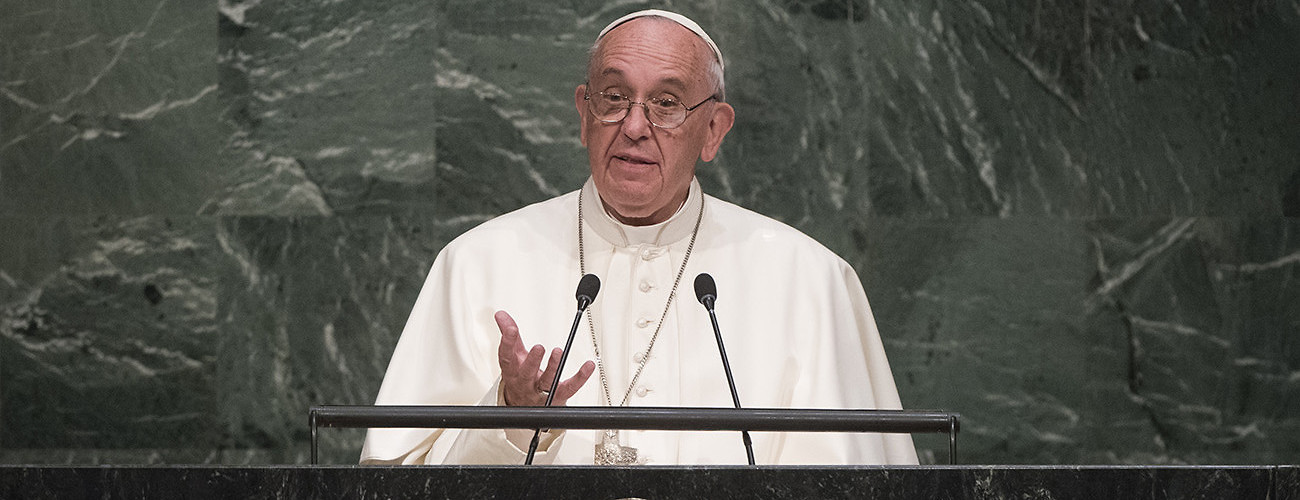Pope Francis addresses the 70th session of the United Nations General Assembly. New York, September 25, 2015. (Cia Pak/UN Photo)
In the eyes of many, religion today is defined by televised beheadings, the ransacking of Parisian synagogues, and sword-wielding Buddhist lynch mobs. The central tenets of world religions–compassion, equality and justice–have been eclipsed by hatred, intolerance, and violent extremism as portrayed by traditional and social media. In this context, Pope Francis’ address to the United Nations this September set an example to all religious leaders on their role and responsibility at a time when the world–and humanity–seems very much adrift.
To hear the Pope speak of the “common home of all men and women,” “universal fraternity,” and the “sacredness of created nature” serves as a useful and refreshing reminder of the essence of religion, especially given its powerful use (and misuse) in politics and international affairs.
In terms of transformative speeches, the Pope’s address was unique in a number of ways. On the one hand, it stood out by virtue of who the Pope is. Indeed, by addressing everything from climate change to economic development and income inequality, he has positioned himself not just as a religious leader but a conscientious, engaged—even progressive—global thinker.
In that sense, the Pope is an unexpected carrier of some very significant messages. His influence therefore should not be underestimated. In the US alone, a Pew Research Center survey conducted recently found that Pope Francis enjoyed a 90% favorability rating among American Catholics. In addition, he is now rated favorably by 70% of all Americans, up from 57% in March 2013. Not to mention, he has an ability to fundamentally alter the contours of internationally diplomacy, as displayed by his facilitating a warming of relations between the US and Cuba.
In the Pope’s words, the “selfish and boundless thirst for power and material prosperity” has led to both the “misuse of available resources and to the exclusion of the weak and disadvantaged.” In referencing the dangers of exclusion, the Pope touched on a nuance that the multilateral system is guilty of shying away from: in UN terminology, this is the so-called “root causes” debate. Indeed, the bold argument made in his address is that political malignancies, for example, terrorism and organized crime, are simply a manifestation of a lack of social inclusion and a deficit of participatory governance.
As research shows, religion is merely a fig leaf for the perpetrators of violence. It is first and foremost the bestial instinct within man that is the true source of such social and political ills. There is potentially no better weapon against crimes committed in the name of religion than religion itself.
Following his appearance at the UN, the Pope participated in an interfaith gathering at New York’s 9/11 memorial. While this was indeed a display of communal harmony and pluralism, it was equally a cri de couer against religious extremism and, as he called it in his address, “falsely universalistic ideologies.” It is this form of interfaith gesture—spearheaded by a figure with gravitas like the Pope—which remains a lacking component in the global effort to counter and prevent violent extremism.
A credible, persuasive, and universal narrative against extremism is desperately needed to dilute destructive ideologies wrapped in religious garb. The Pope is undoubtedly setting an example among leaders within other faiths and denominations.
The question that remains however is who among 1.6 billion Muslims, a billion Hindus, and hundreds of millions of Buddhists can play a similar role? Who is that emblematic figure who can go beyond representing a major faith and provide a message that is as bold, persuasive, and universal?
Above all, the Pope exemplified strong and engaged leadership, a feature much lacking in today’s disarrayed world, seemingly headlined with the question: Who is in charge? This leadership deficit has made the future of humanity all the more terrifying amidst a backdrop of war, pandemics, and chronic displacement. And yet it is a leadership couched in modesty and humility. As the speech came to an end, the Pope asked: “If any of you are not believers, I ask you to wish me well.”
Sometimes a speech can change the world. The responsibility to enact that change, however, rests not with the speaker alone but with our ability to reflect on the wording, internalize its lessons, and take action in whatever way we can. On the 70th anniversary of the United Nations, the Pope has given the international community some serious food for thought.





